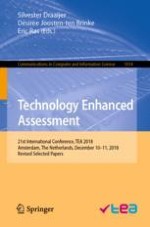2019 | OriginalPaper | Buchkapitel
Getting to Grips with Exam Fraud: A Qualitative Study Towards Developing an Evidence Based Educational Data Forensics Protocol
verfasst von : Christiaan J. van Ommering, Sebastiaan de Klerk, Bernard P. Veldkamp
Erschienen in: Technology Enhanced Assessment
Aktivieren Sie unsere intelligente Suche, um passende Fachinhalte oder Patente zu finden.
Wählen Sie Textabschnitte aus um mit Künstlicher Intelligenz passenden Patente zu finden. powered by
Markieren Sie Textabschnitte, um KI-gestützt weitere passende Inhalte zu finden. powered by
